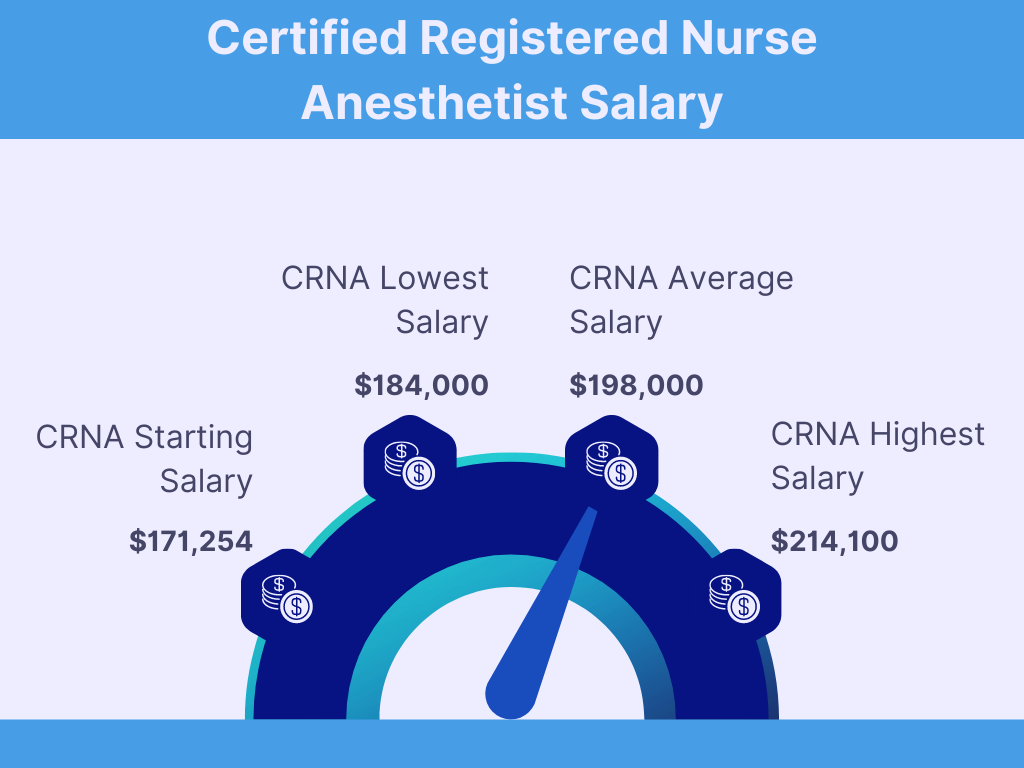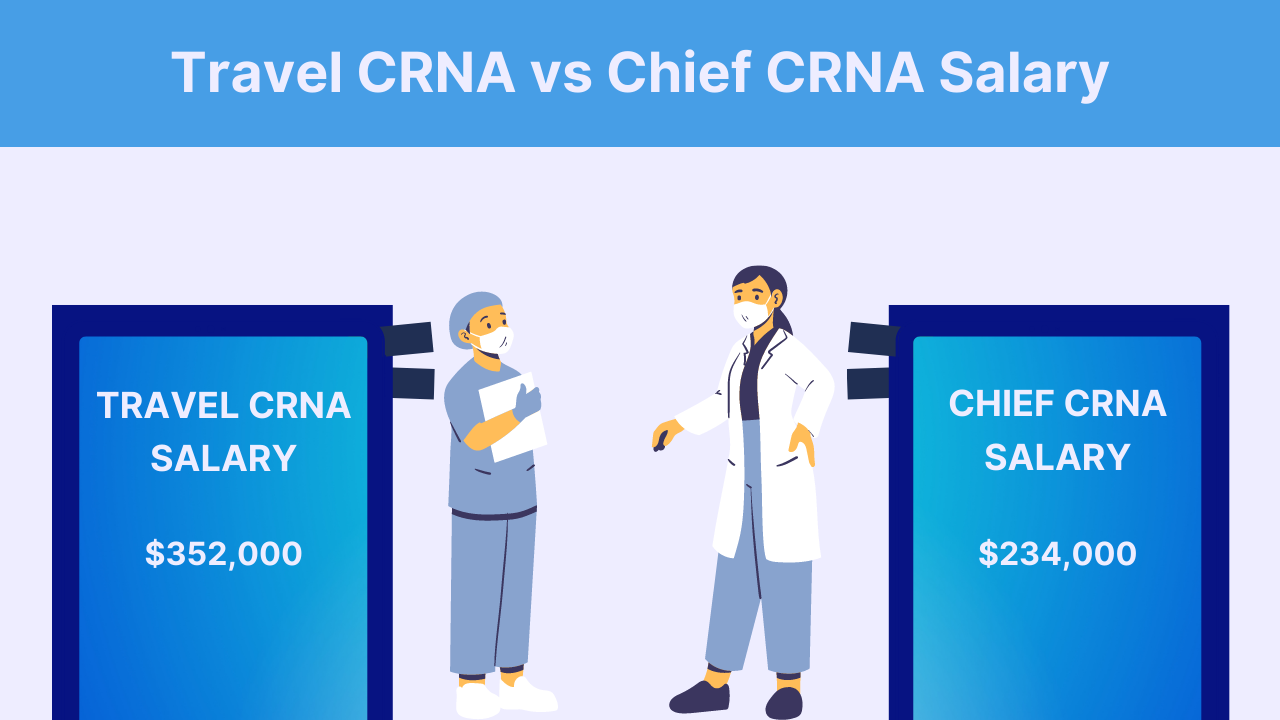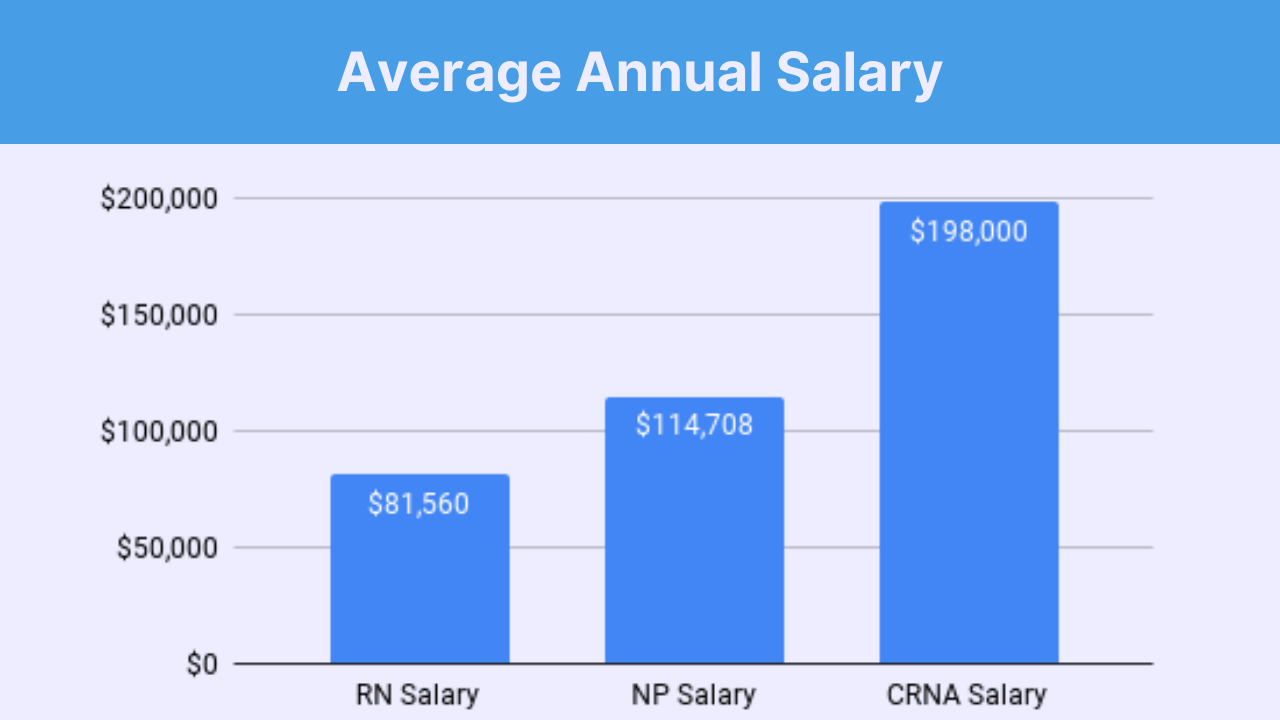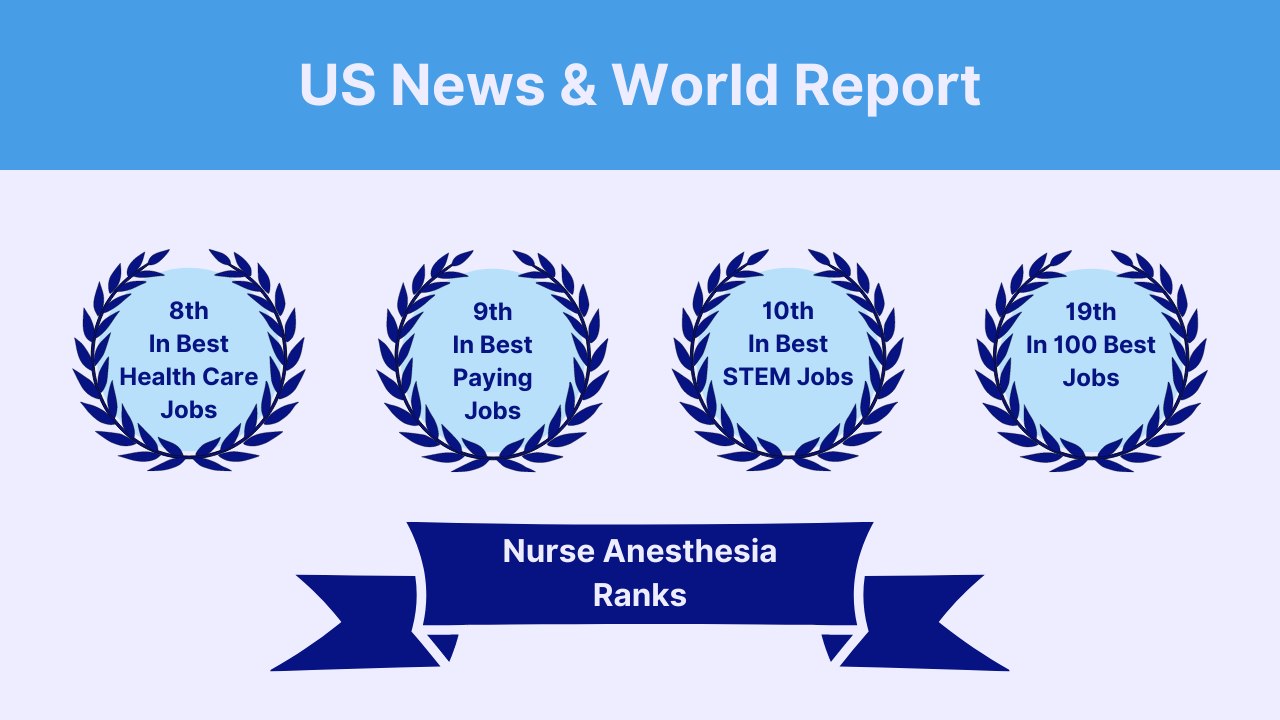
If you’re looking for information on how much a nurse anesthetist makes, you’ve come to the right place. Let’s get detailed information about the nurse anesthetist’s salary. Note that conditions in your area may vary.
Nurse anesthetists can use a number of intravenous drugs and inhaled gasses to administer general or regional anesthesia, so surgeons and other physicians can complete procedures with little to no discomfort to the patient. Modern anesthesia has come a long way from the chloroform administered by the first nurse anesthetists in the Civil War. “Anesthesia is safer today than it’s ever been,” says Frank Gerbasi, a certified registered nurse anesthetist and executive director of the Council on Accreditation of Nurse Anesthesia Educational Programs.
Salary is an essential factor to consider when choosing a career, no matter how much you love the job. While it shouldn’t be the only factor to consider, it is important to know when planning for the future!
Becoming a Certified Registered Nurse Anesthetist (CRNA) is time-consuming and expensive. It takes dedication, planning, and a strong work ethic to get into CRNA school. With many years of school and thousands of dollars (sometimes hundreds of thousands) spent, it is important to know that you will make a good return on your investment.
CRNA Salary: Annual, Monthly & Hourly
So, you’re probably wondering, how much do CRNAs make an hour? And what is the CRNA monthly salary? How much does a nurse anesthetist make a year?
According to Salary.com, the average annual salary for CRNAs in the United States is $198,00. This works out to a monthly CRNA salary of $16,500. CRNA hourly pay comes out to $95. This is an excellent salary compared to other careers, and it is the highest-paid position in nursing!
| CRNA annual salary | $198,000 |
| CRNA monthly salary | $16,500 |
| CRNA hourly pay | $95 |
However, we all know that no one starts at the average salary; you work up to that over time and with experience. So how big of a factor does experience play in your nurse anesthetist salary?
CRNA Salary: Starting, Average & Highest
What is a nurse anesthetist’s starting salary? What about a nurse anesthetist’s average salary? And finally, after a long and productive career, you may wonder what your full earning potential would be, or in other words, what is the CRNA’s highest salary?

| CRNA starting salary | $171,254 |
| CRNA lowest salary | $184,000 |
| CRNA average salary | $198,000 |
| CRNA highest salary | $214,100 |
Certified Registered Nurse Anesthetist Salary: Best CRNA Jobs
There are many opportunities for CRNAs in terms of work setting, work hours, and whether or not you’re required to be “on-call” during your career. Each of these options will have an impact on your pay potential. So here, we will list the various CRNA salaries, such as travel nurse anesthetist salary, chief nurse anesthetist salary, etc.
And while the term “best CRNA jobs” is subjective, these nurse anesthesia jobs are the most frequently researched.

| Travel CRNA Salary | $352,000 |
| Chief CRNA Salary | $234,000 |
CRNA Salary: Similar Career Comparisons
CRNA Salary vs. NP Salary vs. RN Salary
Nurse anesthesia is a unique and special career choice because it is the highest paid of the four advanced practice nursing specialties. The other advanced practice registered nursing [APRN] specialties include nurse practitioners, clinical nurse specialists, and certified nurse-midwives. Of those, most registered nurses who are considering the CRNA career route are deciding between CRNA and NP (nurse practitioner). The unspoken third choice is to not advance your education at all, so we’re adding a standard registered nurse salary so you can visualize that in comparison.

| RN Salary | $81,560 |
| NP Salary | $114,708 |
| CRNA Salary | $198,000 |
CRNA vs. NP Job Satisfaction
While both NPs and CRNAs are almost equally satisfied with their jobs (96% and 97%, respectively), their jobs are very different. If you’re considering which career choice is a better fit for you, the key difference to consider (outside of salary) is how social you wish to be during your career.
While helping people and making a difference in patients’ lives is one of the key factors for job satisfaction in the nurse practitioner career, it isn’t so for CRNAs. Rather, the most rewarding part of the CRNA career is the job itself. One career focuses on building relationships and seeing/knowing patients face to face. The other career focuses on caring for patients while they are asleep: critical thinking, planning, monitoring, and making key decisions in critical moments.
Nurse Anesthetist Salary vs. Anesthesiologist (MD) Salary
Some future CRNAs stumble across the career because of their interest in anesthesia. There are two routes to practicing anesthesia autonomously in the US: medical school (anesthesiology) and nursing (nurse anesthesia). While nurse anesthesia requires a minimum of 8 years before you can practice (4 years for a BSN, 1 year ICU experience as a registered nurse, and 3 years in a DNP program), anesthesiology requires a minimum of 12 years (4 years of undergraduate study, 4 years of medical school, and 4 years of residency, followed by 1 year in a fellowship program or 2 years in private practice).
So, what’s the difference between a nurse anesthetist’s and an anesthesiologist’s salary? See the chart below.
| CRNA Salary | $198,000 |
| Anesthesiologist Salary | $404,000 |
Nurse Anesthetist vs. Anesthesiologist (MD): Skills, Scope of Practice & Patient Safety
CRNAs and anesthesiologists are equally competent to provide anesthesia care to a wide variety of patient populations. In fact, CRNAs are the sole providers of anesthesia in many (mostly rural) hospitals across America.
For this reason, anesthesiologists in large cities often use the ACT (Anesthesia Care Team) model. In this model of care, an MD anesthesiologist supervises as many as four CRNAs who are administering anesthesia simultaneously in separate operating rooms.
CRNA Job Satisfaction & Autonomy
It’s one thing to make a big income. It’s quite another thing to enjoy working every day. But if you can earn a high income and love what you do, you have hit the career jackpot.
In many surveys taken over many years, CRNAs consistently love their jobs. One such study confirming this is the 2019 study by the AANA (American Association of Nurse Anesthesiology). It found that most CRNAs, 89%, are either “very satisfied” (48%) or “somewhat satisfied” (41%) with their current job.
Further confirmation of this comes from US News & World Report, which ranks & compares jobs according to these factors: median salary, unemployment rate, 10-year growth volume, 10-year growth percentage, future job prospects, and stress level.

One factor that has come up repeatedly in surveys of job satisfaction of CRNAs is autonomy. Those who have greater autonomy report greater job satisfaction. Some CRNAs find less satisfaction in their jobs when they feel they are unable to make the final decision regarding the care of their patients. This applies most directly to CRNAs working in the ACT model (see section above for details).
However, it’s important to note that in some states and cities, MD supervision of anesthesia is done remotely or in name only. In other regions, supervision of care is direct. It is direct supervision that has a negative correlation with job satisfaction.
CRNA Salary By State
Which state you live in while practicing as a CRNA will also impact your salary. But a dollar in New York doesn’t go quite as far as a dollar in Arkansas, so we’ve also included a column where we’ve done the math for you and adjusted the annual salary for the cost of living.
| CRNA Salary by State/City | Average Hourly | Average Annual Salary | Cost of Living (COL) Index | Annual Salary Adjusted for COL |
| Alabama (AL) | $89.18 | $185,504 | 87.9 | $163,058 |
| Alaska (AK) | $106.69 | $221,931 | 127.1 | $282,074 |
| Arizona (AZ) | $94.10 | $195,733 | 103.2 | $201,996 |
| Arkansas (AR) | $87.78 | $182,586 | 90.9 | $165,970 |
| California (CA) | $106.31 | $221,140 | 142.2 | $314,461 |
| San Francisco | $118.99 | $247,500 | N/A | N/A |
| Sacramento | $102.88 | $214,001 | N/A | N/A |
| Los Angeles | $107.69 | $224,001 | N/A | N/A |
| San Diego | $102.74 | $213,700 | N/A | N/A |
| San Jose | $119.47 | $248,500 | N/A | N/A |
| Colorado (CO) | $94.90 | $197,400 | 105.3 | $207,862 |
| Connecticut (CT) | $103.02 | $214,300 | 121.6 | $260,588 |
| Delaware (DE) | $99.93 | $207,875 | 107.9 | $224,297 |
| Florida (FL) | $90.42 | $188,078 | 100.3 | $188,642 |
| Miami | $92.69 | $192,800 | N/A | N/A |
| Orlando | $90.57 | $188,400 | N/A | N/A |
| Tampa | $90.62 | $188,500 | N/A | N/A |
| Jacksonville | $90.24 | $187,701 | N/A | N/A |
| Georgia (GA) | $92.08 | $191,542 | 88.8 | $170,089 |
| Atlanta | $94.15 | $195,836 | N/A | N/A |
| Hawaii (HI) | $99.86 | $207,717 | 193.3 | $401,516 |
| Idaho (ID) | $89.83 | $186,854 | 102.1 | $190,777 |
| Illinois (IL) | $97.78 | $203,401 | 94.3 | $191,807 |
| Chicago | $101 | $210,100 | N/A | N/A |
| Indiana (IN) | $92.99 | $193,423 | 90.6 | $175,241 |
| Iowa (IA) | $91.10 | $189,500 | 89.9 | $170,360 |
| Kansas (KS) | $90.32 | $187,880 | 86.5 | $162,516 |
| Kansas City | $93.43 | $194,353 | N/A | N/A |
| Kentucky (KT) | $89.56 | $186,296 | 93.1 | $173,441 |
| Louisiana (LA) | $91.18 | $189,661 | 93 | $176,384 |
| New Orleans | $94.18 | $195,900 | N/A | N/A |
| Maine (ME) | $91.75 | $190,849 | 115 | $219,476 |
| Maryland (MD) | $98.17 | $204,201 | 124 | $253,209 |
| Massachusetts (MA) | $103.55 | $215,398 | 135 | $290,787 |
| Boston | $107.24 | $223,060 | N/A | N/A |
| Michigan (MI) | $95.25 | $198,135 | 91.3 | $180,897 |
| Minnesota (MN) | $97.37 | $202,530 | 100 | $202,530 |
| Mississippi (MS) | $82.80 | $172,239 | 83.3 | $143,475 |
| Missouri (MO) | $90.70 | $188,671 | 89.8 | $169,426 |
| St. Louis | $93.75 | $195,000 | N/A | N/A |
| Montana (MT) | $86.29 | $179,501 | 100.7 | $180,757 |
| Nebraska (NE) | $87.28 | $181,544 | 93.7 | $170,106 |
| Las Vegas (NV) | $97.25 | $202,300 | N/A | N/A |
| New Hampshire (NH) | $96.63 | $201,000 | 109.9 | $220,899 |
| New Jersey (NJ) | $105.24 | $218,900 | 115.2 | $252,172 |
| New Mexico (NM) | $87.01 | $181,000 | 91 | $164,710 |
| New York (NY) | $102.12 | $212,429 | 148.2 | $314,819 |
| New York City – NYC | $114.50 | $238,166 | N/A | N/A |
| Buffalo | $91.05 | $189,401 | N/A | N/A |
| North Carolina (NC) | $90.80 | $188,869 | 95.7 | $180,747 |
| Raleigh | $92.11 | $191,600 | N/A | N/A |
| Charlotte | $93.23 | $193,934 | N/A | N/A |
| North Dakota (ND) | $89.37 | $185,900 | 98.2 | $182,553 |
| Ohio (OH) | $92.93 | $193,304 | 91.3 | $176,486 |
| Oklahoma (OK) | $86.94 | $180,851 | 87.9 | $158,968 |
| Oregon (OR) | $94.8 | $197,184 | 130.1 | $256,536 |
| Pennsylvania (PA) | $95 | $197,600 | 102.5 | $202,540 |
| Philadelphia | $101.97 | $212,101 | N/A | N/A |
| Pittsburgh | $93.79 | $195,101 | N/A | N/A |
| Rhode Island (RI) | $99.95 | $207,901 | 117.2 | $243,659 |
| South Carolina (SC) | $89.13 | $185,401 | 93.6 | $173,535 |
| South Dakota (SD) | $81.47 | $169,468 | 101 | $171,162 |
| Tennessee (TN) | $86.49 | $179,900 | 89 | $160,111 |
| Knoxville | $87.35 | $181,700 | N/A | N/A |
| Nashville | $88.46 | $184,001 | N/A | N/A |
| Texas (TX) | $93.46 | $194,407 | 92.1 | $179,048 |
| Houston | $97.56 | $202,926 | N/A | N/A |
| Dallas | $94.56 | $196,689 | N/A | N/A |
| San Antonio | $92.59 | $192,600 | N/A | N/A |
| Utah (UT) | $90.17 | $187,569 | 99 | $185,693 |
| Vermont (VT) | $91.65 | $190,651 | 117 | $223,061 |
| Virginia (VA) | $94.60 | $196,788 | 101.8 | $200,330 |
| Washington (WA) | $101.68 | $211,500 | 111.6 | $236,034 |
| Seattle | $104.07 | $216,467 | N/A | N/A |
| West Virginia (WV) | $84.33 | $175,407 | 90.5 | $158,743 |
| Wisconsin (WI) | $93.79 | $195,100 | 96.4 | $188,076 |
| Wyoming (WY) | $84.71 | $176,200 | 94.3 | $166,156 |
Moreover, the average nurse anesthetist salary in Canada as per salaryexpert.com is $194,731 with an hourly rate of $94.
What Degree Do You Need To Practice Nurse Anesthesia?
The nurse anesthesia degree has evolved much over the years. Up until 1998, you could obtain CRNA certification in a baccalaureate program. For twenty-four years past that date, a master’s degree program was required.
As of January 1st, 2022, all CRNA programs nationwide have transitioned to doctoral programs, as required by the COA (Council on Accreditation). Those who began a nurse anesthesia program before this date are “grandfathered in” and will never be required to advance their degrees; only those who begin their education after this date.
If you’re a practicing CRNA with a master’s degree, you may wonder if it’s worthwhile to put your time and money into a DNP completion program. Let’s compare your earning potential with a master’s degree vs. a doctorate degree.
| MSNAP salary | $93,000 |
| DNAP salary | $102,000 |
CRNAs are lucky to have a rewarding and fulfilling job that also pays well. If you are interested in this field, make sure to continue to learn about all aspects of this job. To learn more about whether nurse anesthesia is a good fit for you, check out the article: Is Nurse Anesthesia a Good Job?
This page was last updated in 2022
Did you find an error on this page? Please report it here